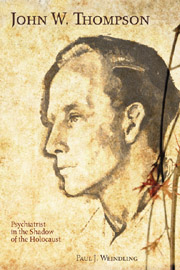Book contents
- Frontmatter
- Contents
- List of Illustrations
- Acknowledgments
- List of Abbreviations
- Part One Into the Dark
- Part Two Redemption
- 9 Belsen, “My Crucifix”
- 10 Medical War Crimes Revelations
- 11 Experimental Ethics
- 12 Therapist for the German Patient
- Part Three Aftermath
- Appendix John Thompson's Writings
- Notes
- Sources
- Index
12 - Therapist for the German Patient
from Part Two - Redemption
Published online by Cambridge University Press: 12 September 2012
- Frontmatter
- Contents
- List of Illustrations
- Acknowledgments
- List of Abbreviations
- Part One Into the Dark
- Part Two Redemption
- 9 Belsen, “My Crucifix”
- 10 Medical War Crimes Revelations
- 11 Experimental Ethics
- 12 Therapist for the German Patient
- Part Three Aftermath
- Appendix John Thompson's Writings
- Notes
- Sources
- Index
Summary
The German Case
Thompson hoped that a scientific tribunal could analyze not only ethics but also how the mind-set of war criminals was embedded in national psychology—and thereby throw light on the root causes of Nazi ideology. He envisaged
a team staffed by psychologists, psychomotrists and psychiatrists to examine and submit a report on the principal individuals among the accused at the Nuremberg trials, as well as on certain other colleagues of theirs who are not available for direct examination.
Thompson believed that Nuremberg was a unique opportunity for psychiatrists to evaluate government leaders and so contribute to historical and political thought. He suggested to Edward Mellanby that the MRC recruit the forensic analyst Edward Glover, who had investigated civilian morale in Britain during the war in terms of aggression, savage human nature, and sadomasochism. Thompson found the works of cultural anthropologists Ruth Benedict and Geoffrey Gorer on national character facile and generalized. He thought that the British military psychologist Major H. V. Dicks (who had the military government brief of turning opportunist Nazis into democrats) was too Freudian and superficial. As Thompson saw it, the problem was why the Germans were so prone to obedience, something that he attributed to lack of choice at home, school, and everywhere else. But requiring a group to adjust to a desired set of cultural values could provoke resentment of those values as a new form of authoritarianism.
- Type
- Chapter
- Information
- John W. ThompsonPsychiatrist in the Shadow of the Holocaust, pp. 159 - 174Publisher: Boydell & BrewerPrint publication year: 2010



